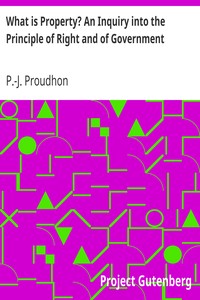What is Property? An Inquiry into the Principle of Right and of Government
"What is Property? An Inquiry into the Principle of Right and of Government" by P. J. Proudhon is a philosophical and political treatise written in the early 19th century. This seminal work challenges conventional notions of property, proposing radical ideas regarding equality and justice in society. Proudhon famously states, "Property is theft," suggesting that the institution of private property is fundamentally unjust and a source of societal inequality. At the start of
the work, Proudhon introduces the central theme of his investigation: the nature of property and its implications for justice and governance. He first proposes that commonly accepted definitions of property, whether based on labor or law, fail to hold when subjected to rigorous analysis. By asserting that property is an effect without a cause, he calls into question the foundations of societal consent and legal structures surrounding ownership. Proudhon's method seeks to dissect these concepts, aiming to demonstrate that true justice and equality must replace existing legal and economic frameworks. The opening chapters promise a critical examination of entrenched societal beliefs, inviting readers to reconsider their views on property and the principles governing human interaction. (This is an automatically generated summary.)
Read or download for free
| How to read | Url | Size | |||
|---|---|---|---|---|---|
| Read now! | https://www.gutenberg.org/ebooks/360.html.images | 1.0 MB | |||
| EPUB3 (E-readers incl. Send-to-Kindle) | https://www.gutenberg.org/ebooks/360.epub3.images | 471 kB | |||
| EPUB (older E-readers) | https://www.gutenberg.org/ebooks/360.epub.images | 484 kB | |||
| EPUB (no images, older E-readers) | https://www.gutenberg.org/ebooks/360.epub.noimages | 442 kB | |||
| Kindle | https://www.gutenberg.org/ebooks/360.kf8.images | 891 kB | |||
| older Kindles | https://www.gutenberg.org/ebooks/360.kindle.images | 855 kB | |||
| Plain Text UTF-8 | https://www.gutenberg.org/ebooks/360.txt.utf-8 | 928 kB | |||
| Download HTML (zip) | https://www.gutenberg.org/cache/epub/360/pg360-h.zip | 462 kB | |||
| There may be more files related to this item. | |||||
Similar Books
About this eBook
| Author | Proudhon, P.-J. (Pierre-Joseph), 1809-1865 |
|---|---|
| Title | What is Property? An Inquiry into the Principle of Right and of Government |
| Credits | Produced by Mike Lough, and David Widger |
| Reading Level | Reading ease score: 56.7 (10th to 12th grade). Somewhat difficult to read. |
| Language | English |
| LoC Class | HB: Social sciences: Economic theory, Demography |
| Subject | Economics |
| Subject | Property |
| Category | Text |
| EBook-No. | 360 |
| Release Date | Nov 1, 1995 |
| Most Recently Updated | Nov 19, 2017 |
| Copyright Status | Public domain in the USA. |
| Downloads | 1239 downloads in the last 30 days. |
| Project Gutenberg eBooks are always free! | |

